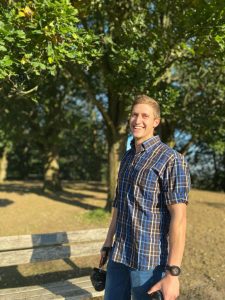MSc Student Alexander about the student life at WUR
Do you wonder what it’s like to study at WUR as an international student? How you can meet other students and if it’s hard to adjust to the Netherlands? Alexander is from Bulgaria and is happy to tell you more about his life in Wageningen.
Could you briefly introduce yourself?
“My name is Alexander, I am 26 years old and I am coming from Bulgaria. I am following the MME (Masters of Management, Economics & Consumer Studies) programme at Wageningen University.”
Where do you live? In a student house like Starflat or do you rent a room in the city?
“I live in Asserpark (one of Idealis’s buildings) I like the multicultural environment I live in. In my corridor there are predominantly internationals, which naturally creates a wonderful environment to share and experience different cultures.”
What do you do besides studying?
“In my free time, I like to play the guitar, read books and do sports. The nearby forest (close to Wageningen-Hoog) is the best place to go for a run or do an outdoor workout. If the weather allows, I love to cycle to the Hoge Veluwe or just relax on the beaches of the Rijn. Unfortunately, I did not have the opportunity to try the ‘Bongerd’ experience due to Covid-19, but I still find the time to exercise in the vicinity of Wageningen”
As an international student abroad, how do you meet other students? Are there special gatherings, in your student house or on-campus you like?
“The AID (Annual Introduction Days) was a true boost to my social life here. I met my best friend Matthijs and I just can’t get enough of hanging out with him. In my house, we organise dinners every last Sunday of the month, in order to bring each other together, which really helps in such pandemic times.”
Do you have favourite spots in the city and why?
“When the gyms were open, I used to go to BasicFit with Matthijs, but now we only go for a run on the Dijk. The Arboretum, de Blauwe Kamer and the forest between Wageningen and Renkum are among the places everyone must visit.”
What do you like the most about studying and living in the Netherlands?
“I have lived in the Netherlands for almost 3 years and what I really love about Dutch people is their openness and tolerance. It doesn’t matter where you come from as long as you do not disturb the mutual peace and you act in a way that is acceptable. The Netherlands is a very organized country and it feels like everyone is eager to help you. The Netherlands is probably the best country in the world and I think everybody should learn from the Dutch way. You know what they say: Keep in touch with the Dutch!”
When did you actually first hear about WUR? And what was the moment you knew for sure this is where I am going to study?
“The first time I heard about WUR was during an open lecture in e Institute of Biology in Sofia, Bulgaria, given by a professor from WUR (whose name, sadly I do not remember). Later I moved to the Netherlands where I worked for nearly 3 years in the field of logistics. I gained a lot from practice but I felt like I needed to bridge the gap between my professional experience and scientific knowledge, specifically related to the environment. This is the main reason why I chose WUR instead of other universities that offer economics programmes, because of the wider scope of the studies that also take nature into account.”
Also, why did you choose your programme?
“My academic background was already in the field of Economics, however, I wanted something more nature-related. Something that will bring up the importance of our environment and not only the value of financial statements. This is why I chose WUR instead of other universities that offer more financially related programmes, so I could feel like I can make a difference in the world.”
Maybe you already know where you see yourself working in the future?
“Honestly, I do not know. Based on my previous work experience I’d love to be a project manager, but that might change. Perhaps I could work as a policy evaluator in the EU agricultural sector. Who knows? Life is full of surprises!”
Which part of your study do you find the most interesting?
“I loved the diversity and flexibility of my study. Professors from different background and cultures really brought together the international atmosphere. My favourite course? Perhaps, Insects as Food & Feed or the hardest one that I had – Decision Science. Favourite professor? From Ruud Zaalberg, through Frits Claasen & Jack Peerlings. It’s very difficult to have a favourite one.”

